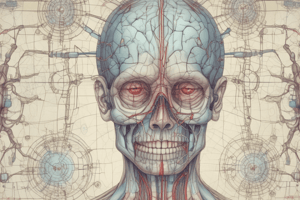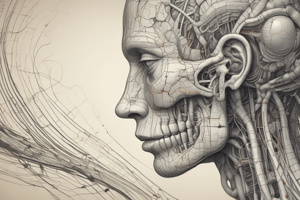Podcast
Questions and Answers
Match the cranial nerve to its function:
Match the cranial nerve to its function:
CN I - Olfactory = Sensory nerve - smell. CN II - Optic = Sensory - from retina. CN III - Oculomotor = Mixed & parasympathetic - motor to eye muscles. CN IV - Trochlear = Motor - superior oblique eye muscles. CN V - Trigeminal = Mixed - sensory from face and motor for chewing. CN VI - Abducens = Motor - abducts eye. CN VII - Facial = Sensory/motor - face and taste. CN VIII - Vestibulocochlear = Sensory - auditory. CN IX - Glossopharyngeal = Mixed - sensory from pharynx and motor to pharynx. CN X - Vagus = Mixed - sensory and motor for thoracic and abdominal viscera. CN XI - Spinal Accessory = Motor - to sternocleidomastoid and trapezius. CN XII - Hypoglossal = Motor - to tongue for speech.
What is the function of CN I - Olfactory?
What is the function of CN I - Olfactory?
Sensory nerve - smell.
What does CN II - Optic do?
What does CN II - Optic do?
Sensory - from retina.
What muscles are affected by CN III - Oculomotor?
What muscles are affected by CN III - Oculomotor?
Signup and view all the answers
What is the primary function of CN IV - Trochlear?
What is the primary function of CN IV - Trochlear?
Signup and view all the answers
What functions does CN V - Trigeminal serve?
What functions does CN V - Trigeminal serve?
Signup and view all the answers
What does CN VI - Abducens control?
What does CN VI - Abducens control?
Signup and view all the answers
What does CN VII - Facial nerve do?
What does CN VII - Facial nerve do?
Signup and view all the answers
What is the function of CN VIII - Vestibulocochlear?
What is the function of CN VIII - Vestibulocochlear?
Signup and view all the answers
What does CN IX - Glossopharyngeal control?
What does CN IX - Glossopharyngeal control?
Signup and view all the answers
What role does CN X - Vagus play?
What role does CN X - Vagus play?
Signup and view all the answers
What does CN XI - Spinal Accessory contribute to?
What does CN XI - Spinal Accessory contribute to?
Signup and view all the answers
What is the function of CN XII - Hypoglossal?
What is the function of CN XII - Hypoglossal?
Signup and view all the answers
Study Notes
Olfactory Nerve (CN I)
- Sensory function related to smell
- Stroke in this region can lead to anosmia (loss of smell)
Optic Nerve (CN II)
- Sensory function; transmits visual information from the retina
- Stroke can cause blindness in the affected eye
Oculomotor Nerve (CN III)
- Mixed nerve with motor and parasympathetic functions
- Supplies 3 rectus eye muscles and inferior oblique for eye movement
- Controls iris constriction for adjusting light entry
Trochlear Nerve (CN IV)
- Motor nerve for the superior oblique muscle
- Responsible for pulling the top of the eye inward toward the nose
Trigeminal Nerve (CN V)
- Mixed nerve with sensory and motor functions
- Sensory innervation from the eye region, maxilla, and mandible
- Motor function essential for chewing; consists of three branches
- Associated with trigeminal neuralgia, known as "suicide disease"
Abducens Nerve (CN VI)
- Motor function; responsible for abducting the eye
- Innervates the lateral rectus muscle
Facial Nerve (CN VII)
- Mixed nerve with sensory and motor functions
- Sensory innervation from the anterior two-thirds of the tongue
- Parasympathetic function to salivary and tear glands
- Motor function crucial for facial expressions
Vestibulocochlear Nerve (CN VIII)
- Sensory nerve involved in auditory perception
- Divided into two branches from the middle ear to the auditory cortex
Glossopharyngeal Nerve (CN IX)
- Mixed nerve providing sensory input from the pharynx and posterior tongue (taste)
- Receives information from carotid and aortic receptors to monitor blood pressure and gas levels
- Motor functions include swallowing and gag reflex; parasympathetic to parotid salivary glands
Vagus Nerve (CN X)
- Mixed nerve with extensive sensory and motor functions
- Sensory from the pharynx, larynx, and various internal organs
- Responsible for monitoring heart and arterial function through chemo and baroreceptors
- Motor role in speech and swallowing; parasympathetic effects on thoracic and abdominal organs
- Damage can be fatal if the entire nerve is affected
Spinal Accessory Nerve (CN XI)
- Motor nerve supplying the sternocleidomastoid and trapezius muscles
- Involved in coordination, proprioception, and swallowing
- Damage may hinder head rotation
Hypoglossal Nerve (CN XII)
- Motor nerve dedicated to tongue and throat function
- Essential for speech and swallowing; damage results in difficulty with these processes
Studying That Suits You
Use AI to generate personalized quizzes and flashcards to suit your learning preferences.
Description
This quiz focuses on the names and functions of the cranial nerves, specifically matching each nerve with its corresponding function. Ideal for students studying anatomy and neuroscience, it emphasizes understanding sensory and motor pathways in relation to cranial nerves.




